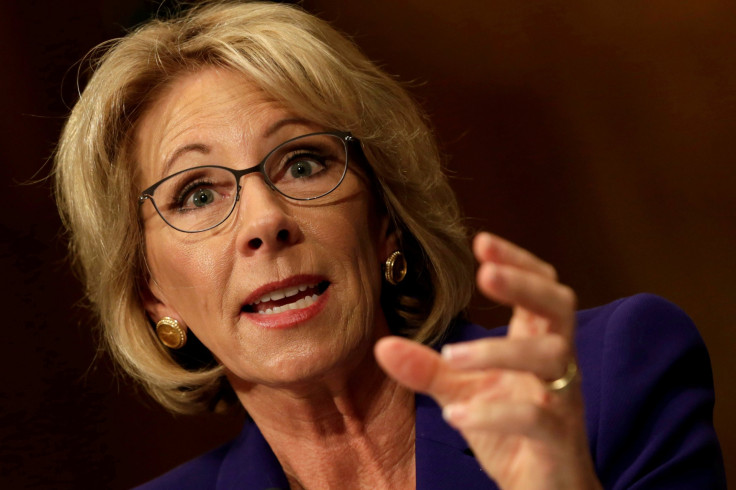How Does School Choice Work? Betsy DeVos Confirmation Hearing Sparks Debate Over Public Schools

UPDATE: 12:44 p.m. EST — The U.S. Senate confirmed nominee Betsy DeVos as the U.S. Secretary of Education Tuesday afternoon, with Vice President Mike Pence casting the tie-breaker following a split Senate vote of 50-50.
Original story:
As the Senate prepared to make a full vote on Michigan Republican and billionaire Betsy DeVos’ confirmation as U.S. Secretary of Education Tuesday, supporters and opponents have pressed for days about whether the controversial nominee deserved to lead the country’s public education system.
DeVos faced a close call during an initial Senate panel vote of 12-11 last week. Democrats spent most of Monday protesting her nomination by “holding the floor” and debating her qualifications for the position. Arguments against DeVos have ranged from her lack of public school education experience to her backing of anti-LGBT causes. However, the most contentious topic that DeVos has strongly supported was school choice: alternative programs that give parents the option to send their children to a school other than the local public institution in their area.
At Betsy DeVos hearing, @SenFranken says Dems shouldn't vote "en masse" against nominees, but "this is I think one we should vote against" pic.twitter.com/yXw38VgCqO
— ABC News Politics (@ABCPolitics) January 31, 2017
“Parents no longer believe that a one-size-fits-all model of learning meets the needs of every child. And they know other options exist, whether magnet, virtual, charter, home, faith-based or any other combination,” DeVos said during her Senate confirmation hearing.
Those who oppose choice programs such as vouchers — when parents receive a part of education funding intended for their child and can use it to enroll their child in a different school — have argued that the funds being used for religious school choices infringe on the First Amendment and damage the structure of traditional public schools.
“Americans are always free to send their children to private schools and religious schools, but raiding the public treasury to subsidize private businesses and religious organizations runs against the public trust and the Constitution,” president of Interfaith Alliance Rabbi Jack Moline told The Washington Post.
Supporters of vouchers have claimed that the choice offers better education for low-income students and the opportunity to avoid a failing education system. Research by the Center for Public Education found that enrollment for schools of choice were miniscule: around 87 percent of children attend public schools. While school choice was a viable option for some students, the center reported that they were “no better or worse than traditional public schools.”
© Copyright IBTimes 2024. All rights reserved.






















